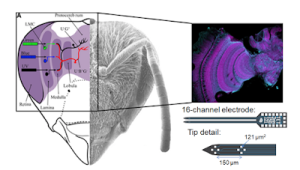Let’s say you’re a bird (passerine). You’ve just noticed a potential predator (hungry). Alarmingly, the predator appears to have already detected you; it’s sizing you up for dinner. You might have noticed the predator earlier if you hadn’t been distracted by the jabbering of another bird (let’s call it Jamie).
But now that you’re aware of the predator, you will focus on monitoring its – wait, what is that ruckus? It’s loud, it’s attention-grabbing, it’s – whoa, whoa, when did the predator get so close? Too dangerous. Time to flee!
Hopefully the thought exercise above demonstrated the idea that background noise can distract animals. Attention is limited, and being distracted can have important consequences on survival. The distracted prey hypothesis posits that animals may be distracted by any stimuli, inhibiting their ability to detect approaching predators.
While a student at UCLA, I obtained the opportunity to investigate this hypothesis in beautiful Moorea, French Polynesia. The findings of the study were recently published in Behavioral Ecology.
 |
A view of Morea, French Polynesia (photo credit). |
My co-authors and I used playback experiments to simultaneously examine the relative effects of anthropogenic sounds, conspecific nonalarm sounds, and heterospecific nonalarm sounds as distractors for common mynas (Acridotheres tristis). We 1) compared myna behavior before and during playbacks and 2) measured the distances at which myna fled from an approaching predator during playbacks. We expected anthropogenic sounds (motorcycle noise) and conspecific nonalarm calls to distract mynas and for heterospecific nonalarm sounds to have little effect.
 |
| Our study species, the common myna. © Copyright Tom Stephenson, 2006-2011 |
Contrary to the distracted prey hypothesis, we found that mynas fled at greater distances when they heard heterospecific nonalarm sounds compared to a silent treatment. This suggests that some social sounds can enhance myna vigilance, even though the sounds come from a different species and should lack information about predatory threats. Our findings show that the effects of acoustic stimuli on prey are not necessarily straightforward. What seems distracting may increase antipredator response in certain contexts. Jamie’s jabbering may save your life yet.
– Will (primarily a marine ecologist)
You can read the paper here.


